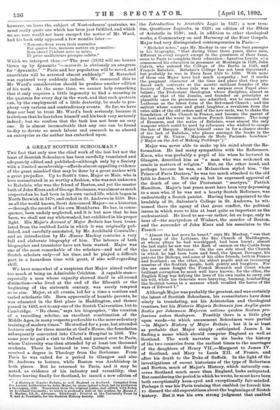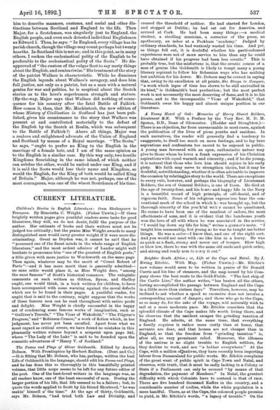A GREAT SCOTTISH SCHOOLMAN.*
THE fact that only now the chief work of the last but not the least of Scottish Schoolmen has been carefully translated and adequately edited and published—although only by a Society with a limited membership—affords almost appalling evidence of the great mischief that may be done by a great author with a great prejudice. Up to Scott's time, Major or Mair, who is here resuscitated in so worthy a fashion, who was not unknown to Rabelais, who was the friend of Beaton, and yet the master both of John Knox and of George Buchanan, was almost as much respected as he had been in his own varied life, which began in North Berwick in 1470, and ended in St. Andrews in 1550. But, as all the world knows, Scott denounced Major—as a historian —through the month of his own Monkbarns. He has, in conse- quence, been unduly neglected, and it is but now that he has been, we shall not say whitewashed, but exhibited in his proper light. His Major's Account of Major Britain has been trans- lated from the crabbed Latin in which it was originally pub- lished, and carefully annotated, by Mr. Archibald Constable ; and an introduction by Mr. /Eneas Mackay contains a very full and elaborate biography of him. The labours of both biographer and translator have not been wasted. Major was one of the most remarkable of the scholars—and not of the Scotch scholars only—of his time, and he played a difficult part in a hazardous time with great, if also self-regarding skill.
We have somewhat of a suspicion that Major aimed rather too much at being an Admirable Crichton. A capable man— especially a man whose capacity showed itself in all-round distinction—who lived at the end of the fifteenth or the beginning of the sixteenth century, was sorely tempted so to aim. Major, at all events, led for a time a restless and varied scholastic life. Born apparently of humble parents, he was educated in the first place in Haddington, and thence passed in 1493, not to any one of the Scotch Universities, but to Cambridge. "He chose," says his biographer, "the vocation of a travelling scholar, an excellent combination of the Middle Ages, in many respects preferable to the more sedentary training of modern times." He studied for a year, but attended lectures only for three months at God's House, the foundation subsequently converted into Christ's Hospital in 1505. The same year he paid a visit to Oxford, and passed over to Paris, whose University was then attended by at least ten thousand students. There he lectured in two Colleges, and finally received a degree in Theology from the Sorbonne. From Paris he was called for a period to Glasgow and also St. Andrews to lecture, while Beaton was Archbishop in both places. But he returned to Paris, and it may be noted, as evidence of his industry and versatility, that before leaving finally for Scotland, he issued a new edition of • A History of Greater Britain, a* well England as Scotland. Compiled from tbe Ancient Authorities by John Major, by name indeed a Scot, bat by profession • theologian, 1521. Translated from the original Latin, and edited. with Notes, by Archibald Constable ; to which is prefixed a Life of the Author, by Anew J. G. Mackay, LL.D., Advocate. Edinburgh Printed at the University Press by T. and A. Constable, for the Scottish His' tory Society. 1592. the Introduction to Aristotle's Logic in 1527; a new trea- tise, Questiones Logicales, in 1528; an edition of the Ethics of Aristotle in 1530; and, in addition to other theological works, a Commentary on and Harmony of the Four Gospels. Major had very distinguished contemporaries in Paris :— " Michelet notes," says Mr. Mackay in one of the best passages in his biography, "that during these three years, three men, different in every respect except in the greatness of their fame, came to Paris to complete their education—Ignatius Loyola. wl o commenced his education in grammar at Montaigu in 1528, John Calvin, who entered the College of Ste Barbe in 1523, and Francis Rabelais. Rabelais's College has not been discovered ; but probably he was in Paris from 1524 to 1530. With none of them can Major have had much sympathy ; but it marks the pregnant character of the time and place that they pro- duced such contrasts as the ascetic militant founder of the Society of Jesus, whose rule was to surpass even Papal abso- lutism; the Protestant theologian whose discipline, almost as strict as that of the Jesuits, and founded on principles as plausible once its premisses are admitted, was to succeed the Lutheran as the latest form of the Reformed Church ; and the satirist whose coarse and giant laughter, a revulsion from the rules alike of the old orders and of the new sects, was to shake the foundation of the Church in France, and become the parent of the best and the worst in modern French literature. The irony of Erasmus, and the satire of Rabelais, were almost the only weapons which could be used by reformers who wished to escape the fate of Berquin. Major himself came in for a chance stroke of the lash of Rabelais, who places amongst the books in the library of St. Victor, ' Majoris de Modo Faciendo boudinos (` Major on the Art of Making Puddings ')."
Major was never able to make up his mind about the Re- formation. He had many sympathies with the Reformers.. Knox, who was probably a pupil of his when be lectured in
Glasgow, described -him as "a man who was reckoned an oracle in matters of religion." But, on the other hand, and perhaps because he was, as Melancthon styled him, "the Prince of Paris Doctors," he was too much attached to the old faith to desert it. Not only so, but he expressed approval of the death of one of the Protestant "martyrs," Patrick Hamilton. Major's last years must have been very depressing to a man who, if he was not a hearty Scotch Reformer, was undoubtedly a Scotch patriot. Having been appointed to the headship of St. Salvator's College in St. Andrews, he wit- nessed there the agony of that great conflict, the political issues in which were to him at least quite as important as the ecclesiastical. He lived to see—or rather, let us hope, only to hear of—the martyrdom of Wishart, the murder of Beaton, and the surrender of John Knox and his associates to the French :—
" Almost the last news he heard," says Mr. Mackay, "was that the Lamp of the Lothians, the fine Church of Haddington„ at whose altars he had worshipped, had been burnt ; almost the last sight he saw was the flash of cannon on the Castle from the tower of St. Salvator. On the one side stood the Church in which he had been born and bred, the Queen Dowager, his patrons the Bishops, and some of his older friends, both in France and Scotland ; on the other, his ablest pupils and an increasing number of the Scottish people, both gentry and burghers. For the one cause fought the French Monarch and Court whose brilliant corruption he must well have known; for the other, the English King was defying the laws of his own realm to carry out his will, while his Generals were harrying, burning, bombarding the Scottish towns in a manner which recalled the havoc of the wars of Edward I."
Although Major was probably the greatest, and was certainly the latest of Scottish Schoolmen, his resuscitators have done
wisely in translating, not his Aristotelian and theological treatises, but his Historia Major-is Britannia jam Anglia. guava Scotia per Johannem Majorem natione guidem. Scotum pro- fessione autem theologum. Possibly there is a little play upon words—to which amusement Schoolmen were partial —in Major's History of Major Britain ; but it is at least as probable that Major simply anticipated James I. in finding a name which should comprise England as well as Scotland. The work narrates in six books the history of the two countries from the earliest times to the marriages of the daughters of Henry VII.,—Margaret to James IV. of Scotland, and Mary to Louis XII. of France, and after his death to the Duke of Suffolk. In the light of the
investigations of recent historians of the type of Robertson and Burton, much of Major's History, which naturally con- cerns Scotland much more than England, looks antiquated. But considering the period in which he wrote, he must have been both exceptionally keen-eyed and exceptionally fair-minded. Perhaps it was his Paris training that enabled (or forced) him to discard the old superstitions about the beginnings of Scotch history. But it was his own strong judgment that enabled him to describe manners, customs, and social and other dis- tinctions between Scotland and England to the life. Then Major, for a Scotchman, was singularly just to England, the English people, and even such detested individual Englishmen as Edward I. Thus, he says: "In England, every village has its parish church, though the village may count perhaps but twenty hearths. In Scotland this is not so; and in this point, as in many others, I reckon the ecclesiastical polity of the English to be preferable to the ecclesiastical polity of the Scots." He dis- approved of "the custom of the vulgar Scot teeny nasty things about the English, and contrariwise." His treatment of the story of the patriot Wallace is characteristic. While be dismisses the English legends about Wallace's savagery, and does him full justice, not only as a patriot, but as a man with a natural genius for war and politics, he is sceptical about the Scotch stories as to the hero's superhuman strength and stature. (By-the-way, Major says that Wallace did nothing of conse- quence for his country after the fatal Battle of Falkirk. How comes it, then, that Mr. Mackintosh, the new edition of whose History of Civilisation in Scotland has just been pub- lished, gives his countenance to the story that Wallace was present at and contributed materially to the defeat of the English by the Scotch at Roslin, which was subsequent to the Battle of Falkirk ?) Above all things, Major was a zealous and enlightened advocate of the Union of England and Scotland by means of a Royal marriage. "The Scots," he says, "ought to prefer no King to the English in the marriage of a female heir, and I am of the same opinion as to the English in a similar ease. By this way only, two hostile Kingdoms flourishing in the same island, of which neither can subdue the other, would be united under one King, and if it is said the Scots would lose their name and Kingdom, so would the English, for the King of both would be called King of Britain." Major, although he was not, perhaps, one of the most courageous, was one of the wisest Scotchmen of his time.

































 Previous page
Previous page